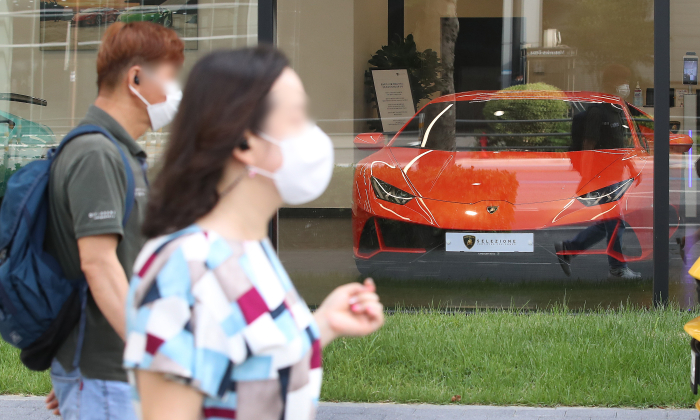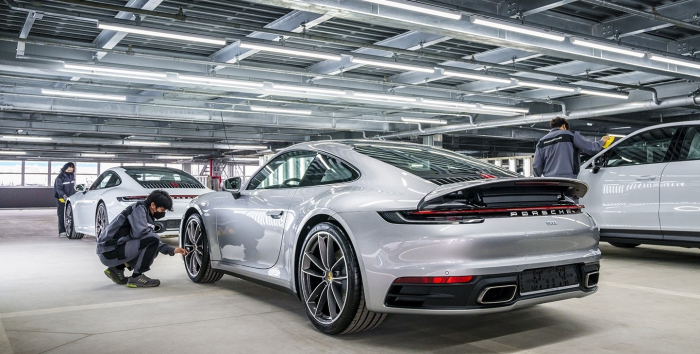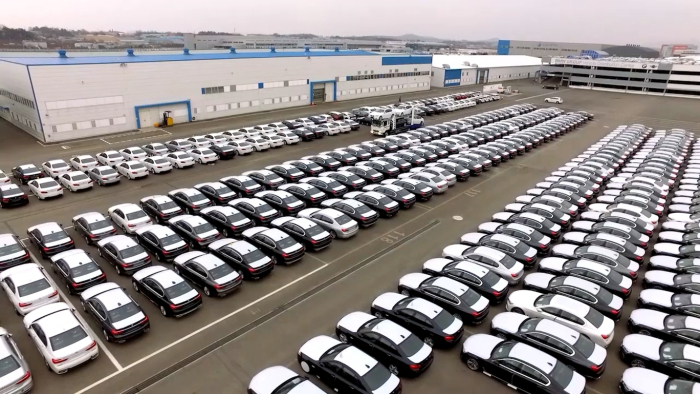Luxury imported car sales growth at 5-yr high in S.Korea
The waiting list for Porsche cars stretches up to one and a half years due to demand and chip shortages
By Aug 17, 2021 (Gmt+09:00)
LG Chem to sell water filter business to Glenwood PE for $692 million


Kyobo Life poised to buy Japan’s SBI Group-owned savings bank


KT&G eyes overseas M&A after rejecting activist fund's offer


StockX in merger talks with Naver’s online reseller Kream


Mirae Asset to be named Korea Post’s core real estate fund operator



Mercedes-Benz, BMW and Porsche have driven the double-digit growth of imported car sales in South Korea in the first seven months of this year, with their luxury models priced at more than 100 million won ($85,000) taking a bigger share of the imported vehicles.
The so-called "revenge shopping," a post-lockdown shopping hype to purchase luxury goods and the wider income gap fueled the 74.1% year-on-year surge in sales of the high-end imported cars in the country between January and July. The increase in their South Korean shipments marked the strongest pace of growth in five years.
Demand for imported vehicles was so strong that the waiting list for Porsche's popular Taycan models stretched up to one and a half years, amid automotive chip shortages. Now Porsche buyers are willing to get their favorite models delivered even without some add-on features such as autonomous driving function, said an official of the German carmaker's South Korean operations.
"In addition to the revenge shopping and income polarization, consumers are increasingly turning their eyes to luxury imported cars because they narrowed a price gap with premium domestic models," said Lee Ho-geun, automotive engineering professor at Daeduk University.
A total of 172,146 units of imported passenger cars have been sold in the country between January and July of this year, up 16.3% year-on-year, according to the Korea Automobile Importers and Distributors Association (KAIDA) on Aug. 17.
In particular, sales of luxury models jumped by 74.1% to 39,965 units during the same period, representing 23.2% of the imported vehicles. Among them, the vehicles priced between 100 million and 150 million won took up the majority of 73%.
Individual buyers make up 34.6% of the high-end imported car sales, versus 28.7% in the year-earlier period.

By brand, Mercedes-Benz and Audi saw their South Korean sales grow by 118.2% and 86.7%, respectively. BMW posted an 81.6% jump in shipments to South Korea from a year earlier.
"Despite our cars being delivered without some options because of the chip shortages, we have not yet seen customers jumping ship because we will have those features installed free of charge when the automotive chip supply conditions improve," said the official at its South Korean operations.
Among the imported cars, sales of eco-friendly models such as electric vehicles almost quadrupled to 20,470 units, with sales of sports utility vehicles up 110%

The buoyant sales of foreign car brands were also attributable to the extension of a temporary 30 percent cut in individual consumption tax on passenger vehicles until the end of this year.
Of the total, sales of luxury models picked up by 66.4% to 22,951 units, taking a 15.5% share of imported cars for the entire year of 2020. Mercedes-Bens took the top spot for a fifth consecutive year, accounting for slightly over one-quarter of them.
Write to Byung-uk Do at dodo@hankyung.com
Yeonhee Kim edited this aricle.
-
 Earnings‘Revenge shopping’ lifts Korean retail giants’ Q2 earnings
Earnings‘Revenge shopping’ lifts Korean retail giants’ Q2 earningsAug 13, 2021 (Gmt+09:00)
2 Min read -
 Automobile salesTax cuts, pandemic lift imported car sales in Korea
Automobile salesTax cuts, pandemic lift imported car sales in KoreaDec 03, 2020 (Gmt+09:00)
2 Min read


